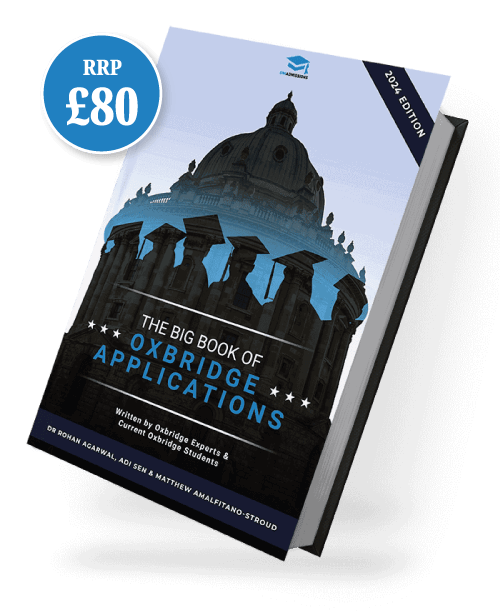The Oxford Law entry requirements are made up of three elements: your grades, Admissions Test results and your performance at the Interview.
Oxford University suggests that their Admissions Tutors look for: academic achievement, reasoning ability, good communication skills both on paper and verbally, a capacity for hard work, and an interest in Law.
We’ll take you through the grades and subjects you need to study and achieve, as well as additional exams or interviews awaiting your application.
Oxford law entry requirements: the grades
The standard offer for Law at Oxford is:
| Academic Requirements | A-levels: | AAA |
| Advanced Highers: | AAB or AA with an additional Higher at grade A | |
| IB: | 38 (including core points) with 666 at HL | |
| Admissions Test | LNAT: | Successful applicants usually score around 27-29 |
If you receive an offer, your place at the university is usually conditional on you achieving these grades.
The Oxford Law entry requirements do not dictate that you study any particular subjects at A-level or the equivalent. It is unnecessary to study Law before applying. However, it is helpful to pick a subject that involves writing essays, such as History or Philosophy. This will enable you to develop skills that will be useful for the Oxford Law course including the ability to construct an argument and write clearly.
However, the Oxford Law entry requirements do need you to demonstrate that you are numerate. You can demonstrate this with a C or 4 grade in GCSE Mathematics or with other appropriate evidence.
When you submit your UCAS application, your grades (such as your GCSEs) will be considered in the context of your prior education, residential postcode, and care background. If, for example, your school performs below the national average or you live in an area where not many people go to university, you will be strongly recommended to be invited for an Interview.
If you are successful at the Interview stage and given a conditional offer such as AAA at A-level, you must still achieve AAA at A-level to take your place on the course.
Discover the World’s First Oxbridge Preparatory School
Welcome to UniAdmissions, the world’s first Oxbridge preparatory school with an Oxbridge success rate of 57% and with over 500+ UniAdmissions students placed at Oxford and Cambridge.
Performing well in the LNAT is crucial for your application. Our Law Full-Blue Programme prepares you to score highly through one-to-one tuition sessions, intensive courses, and more.
Oxford law entry requirements: LNAT
Under the Oxford Law entry requirements, it is essential that you take the National Admissions Test for Law (LNAT). Oxford uses the LNAT to assess your aptitude for the skills required to study Law.
The LNAT is split into two sections, Section A and Section B. Section A is a multiple-choice section. Following the test, you will receive a mark out of 42 and this number will be sent to Oxford. Section B is an essay question. You will not receive a mark for this section, but your essay will be sent to Oxford for the tutors to assess. In this essay, the tutors want to see that you can argue persuasively and reach a conclusion.
Past LNAT data shows that average scores for all Oxford applicants is around 24, shortlisted applicants score around 28 and successful applicants score around 29. Therefore, aiming for a high score is important when applying for Oxford Law.
Oxford law entry requirements: the interview
After the Oxford Admissions Tutors have considered your application, you might be invited to an Interview.
At the Interview, your academic ability and potential will be assessed. The tutors use the Interview to find out how you think, rather than test your current knowledge. They want to know if you can put forward a justified argument and consider the counter-argument.
It is also an opportunity to see if the Oxford tutorial system suits you.
Access "The Big Book Of Oxbridge Applications" For FREE
The Oxford law application process is tough, so download The Big Book Of Oxbridge Applications for free to discover everything you need to know to get your offer. Through over 350 pages, you’ll find:
- Over 40 admissions test practice questions
- 28 example Oxbridge Personal Statements
- Interviews with Oxbridge students and graduates
- Additional downloadable resources
Fill in your details below to claim your digital copy today!

Oxford law entry requirements: the Personal Statement
Although Oxford Admissions Tutors do not place more importance on the Personal Statement over the other areas of your application, it is still an important factor in your overall application.
As Oxford University suggests, there is not a secret formula to writing a Personal Statement for Law. The general rule of thumb is to use your Personal Statement to show how committed you are to the subject you would like to study and how you have engaged with your subject through wider reading, work experience or other extra-curricular activities.
Students are often concerned that they need to go to extreme lengths to make their Law Personal Statement stand out. As long as you demonstrate your academic abilities, suitability to the degree and passion (evidence of extra-curricular activities), a Personal Statement should stand out for the right reasons.
Want a 5-second summary of our Oxbridge Law Programme?
Don´t miss out on the opportunity to maximise your potential and triple your chances of success. Peek inside our Law Premium Programme brochure and discover all the information you need to begin your Oxbridge journey.
Beat the Oxford Law Entry Requirements with UniAdmissions.
We help you craft the perfect Oxford Law Personal Statement, achieve a highly competitive LNAT score and teach you how to Interview effectively – covering all areas of your Oxford University application.
Discover how you can triple your chances of success with our Oxbridge Law Full-Blue Programme by speaking with our expert Admissions Team today.







